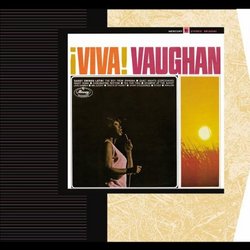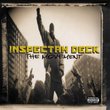| All Artists: Sarah Vaughan Title: Viva Vaughan Members Wishing: 0 Total Copies: 0 Label: Polygram Records Original Release Date: 1/1/1964 Re-Release Date: 3/13/2001 Album Type: Extra tracks, Original recording remastered Genres: Jazz, Pop, Broadway & Vocalists Styles: Traditional Jazz & Ragtime, Vocal Jazz, Oldies, Vocal Pop, Traditional Vocal Pop Number of Discs: 1 SwapaCD Credits: 1 UPCs: 731454937429, 0731454937429 |
Search - Sarah Vaughan :: Viva Vaughan
 | Sarah Vaughan Viva Vaughan Genres: Jazz, Pop, Broadway & Vocalists
|
Larger Image |
CD DetailsSimilar CDs |
CD ReviewsVAUGHAN AND COMPANY AT WORK! Giovanni | Chicago IL | 03/23/2001 (5 out of 5 stars) "Considering the talent that's involved here, it's really surprising this release didn't do wonderful back in 1964, even if the songs were standard fare and the bossanova thing was being done to death. Even if you delete Sassy's name from the album, it was produced by the immortal Quincy Jones, with the charts by (then) first time arranger/conductor Frank Foster, recently a fledgling from an 11 year stint with the Basie organization. Foster's arrangements are superb. Tasteful, and not overblown. He never tries too hard for the Latin sound. Neither does Miss Vaughan, whose voice is one of America's everlasting wonders. I was particularly pleased with the reading of "The BOY From Ipanema" and Henry Mancini's "Mr. Lucky". A reading of "Fever" fits well with the latin theme, and helped me appreciate a song I never much cared for. But, as Verve tries to do so often with these wonderful re-releases, they provide a great bonus track with "A Taste Of honey" tagged by Sassy at the end as only she could do. This is a refreshing release of a very nice album by some fantastic artists all on the same page, one I'm certain that will do better than it did back in '64. Play this one at your upcoming BBQ's or outdoor parties and enjoy!" Long live silky Latin jazz John Jones | Chicago IL | 03/25/2002 (5 out of 5 stars) "The mid-60's found the music world mad about the Bossa Nova. Stan Getz could be thanked for kicking off the trend; his Getz/Gilberto album introduced America to the sensuous, liquid rhythms of Brazil, and whether it was called Latin jazz, Afro-Cuban, or Bossa Nova, the music was as seductive as anything anyone this side of the Atlantic had ever heard. Getz's wild success naturally led to others jumping on the bandwagon, and few were more successful at it than Sarah Vaughan. Her lush voice, with her trademark vibrato, was perfect for gliding over Brazilian percussion, and as a result "Viva Vaughan" ranks as one of her finest, most irresistible sets.The gently-upbeat "The Boy from Ipanema" was a natural choice to kick off the album, as the song was such a huge hit for Stan Getz and Astrud Gilberto, and Vaughan handles the song with her usual ease. But it's the album's second Antonio Carlos Jobim composition, "Quiet Nights," that really leaves an impression. Sarah starts the song off in a near-whisper, with acoustic guitar chords and shakers softly behind her. When the strings and flute come in on the second verse it's hard to imagine a more perfect song for candlelit seduction.But the most impressive aspect of the album is how successfully arranger Frank Foster transforms jazz standards into Afro-Cuban treasures. "Avalon," usually performed as a breakneck swing, is favorably turned into a fevered samba, while a cha-cha backdrop sheds a completely fresh light on what it means to be "Stompin at the Savoy." "Shiny Stockings" and "Tea for Two" each undergo midtempo Brazilian makeovers, but the most inspired has to be Peggy Lee's "Fever," even if Sarah does mildly flub the lyrics near the end: after singing "chicks were born to give you fever, be it farenheit or centigrade," she accidentally claims, "they give ME fever," followed by an "mmm!" that's obviously an "oops!" She gives herself a nice save with "when THEY kiss THEM," but her mistake has obviously thrown her and her timing's a bit off. Obviously producer Quincy Jones found the rest of her take to be so melodically dead-on (and indeed he was right) that this minor flaw could be overlooked. It's noticeable but luckily it doesn't mar the track.A couple of songs were timely upon recording but never turned into standards, so for general audiences today they'll be delicious new discoveries: Henry Mancini's "Mr. Lucky" from the television series of the same name, and the image-filled "Night Song" from the musical "Golden Boy." Throw in a deeply hip reading of Nat Adderly's "Jive Samba" and you realize there isn't a weak link in the whole set. A reading of "A Taste of Honey" must have been left behind because it's only half-Brazilian, with the choruses laid out in traditional swing. Still, it's a fabulous reading and arrangment and Verve is right to include it as a bonus track for this reissue.It's a bit of a shock that this album wasn't a commercial success upon its 1965 release: the arrangements, while artistically sound, were timely for the Bossa Nova craze, and a third collaboration between Vaughan and Quincy Jones (following "Vaughan and Voices" and the fabulous "Vaughan and Violins") was certainly at that point a no-brainer for superior music. But art not equalling commerce is the oldest crime in the industry, so it looks like jazz fans in the know can enjoy another wrongly well-kept secret. And surely any fan of Sarah's one-of-a-kind voice will listen to the spotless remaster of this undersung classic album and cry, "Viva Vaughan!" Another proud chapter in her impressive legacy."
|

 Track Listings (13) - Disc #1
Track Listings (13) - Disc #1![Delibes - Lakmé / Mesplé, Burles, Soyer, Millet, Opéra-Comique, Lombard [highlights]](https://nationalbookswap.com/cd//m/63/8663/6008663.jpg)

